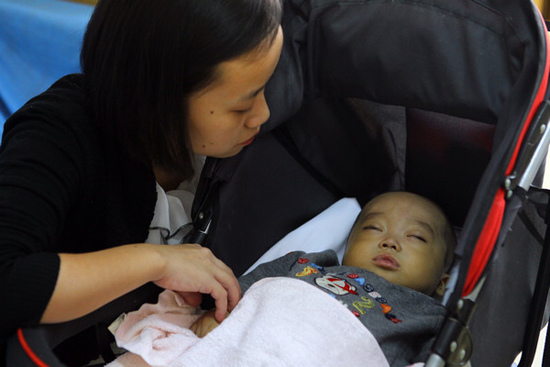
Luo Dan, a mother involved in a liver-swap surgery, takes care of her son on Monday at the General Hospital of the Armed Police Forces in Beijing. The boy received a liver transplant from another woman. Zou Hong / China Daily
Two women and their sons who underwent the first paired-liver transplant surgery in China are ready to be discharged, doctors at the General Hospital of the Armed Police Forces in Beijing said.
Yin Chunlin, 22, and Luo Dan,23, gave part of their livers to each other's baby sons in an operation on Sept 14 to save them from biliary atresia, a liver condition that can occur in newborn babies.
In the babies with such a condition, bile flow from the liver to the gallbladder is blocked. This can lead to liver damage and cirrhosis, which is deadly if not treated.
Surgeon Li Wei said Yin's baby has generally recovered, but it will take some time for the liver of Luo's baby to function normally. "But this (the slower pace of recovery) doesn't affect the date of discharge," Li said.
Song Yuqiong, Yin's mother, said her grandson appeared to be much happier. "Now he feels much better, and is comfortable with anybody picking him up," she said.
However, the babies will need regular examinations to check for possible complications, said Chen Xinguo, deputy director of the hospital's organ transplant institute.
Chen said the babies will be taking medication that will affect their immune systems so they have an increased chance of infection. But if the dosage is insufficient, they will suffer liver rejection.
The mothers are recovering well from the surgery, Chen said.
Li said that since the surgery, more parents have visited the hospital to inquire about the possibility of such operations for their children. The hospital has found a paired-transplant partner for another woman and her baby.
Regulations covering organ transplants state that living donors must only be spouses or close relatives of the recipient, but they do not mention the issue of paired transplants. "It doesn't forbid such paired donations, neither does it encourage them," Li said.
Xu Na, 25, from the Inner Mongolia autonomous region, said she thought of such a transplant for her baby when she heard of Yin's and Luo's cases, but said the chances of success were slim.
"My blood type is AB, which the doctor said is compatible with donations of any blood type, thus making my offer to babies of AB blood type unattractive," she said.
Fei Haixia, 40, from Shanxi province, has the same problem. She said she has been staying with her 8-month-old son in the hospital waiting for a donation since late August.
"My husband's blood type is O, but he drinks and isn't a good donor," she said.
Li said paired transplants were not so feasible for these people. "They can wait, or they can consider transplanting between different blood types," he said, but stressed that cross-blood transplants were the last choice.
There are three sources of livers for children: parents, deceased adult donors, and deceased child donors.
However, Chen said most of the children in the hospital received liver donations from adult donors who had died, mainly because parents do not match for such transplants and there is a lack of child donors.
"Part of the liver will be transplanted into the child, and the other into an adult, because a person's liver cannot weigh more than 4 percent of their body weight. This makes the work of matching the transplant harder. And we need to consider if the liver tissue left is enough for the other person," said Chen.
"I hope there will be more cases of child-to-child donations in the future, so that surgeons don't have to match and cut one liver for two people, and the transplant of a whole liver will lower the chances of infection in a child."

Copyright ©1999-2011 Chinanews.com. All rights reserved.
Reproduction in whole or in part without permission is prohibited.